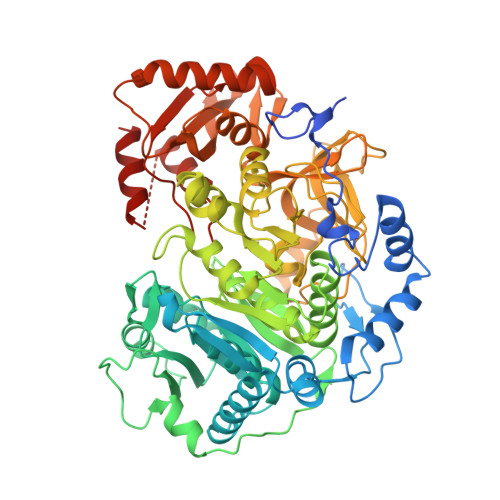Synthesis and evaluation of acyl-AMP phosphate isosteres as inhibitors of fungal acetyl CoA synthetase.
Daraji, D.G., Jezewski, A.J., Alden, K.M., Propp, J.P., Heene, M.E., Soldan, C.A., Liu, L., Battaile, K.P., Lovell, S., Staker, B.L., Krysan, D.J., Hagen, T.J.(2025) Bioorg Med Chem Lett : 130389-130389
- PubMed: 40885291
- DOI: https://doi.org/10.1016/j.bmcl.2025.130389
- Primary Citation of Related Structures:
5IFI, 8V5G - PubMed Abstract:
Acetyl-CoA synthetase (ACS) is a member of the adenylate-forming enzymes superfamily. This enzyme plays a crucial role in cellular metabolism. While ACS enzymes are non-essential in mammals, they are essential in some fungal species and parasites that are pathogenic to humans. Hence, inhibition of the ACS enzyme is an emerging target for the development of novel anti-infectives. Alkyl AMP esters and acyl sulfamoyl adenosine (Acyl-AMS) are potent inhibitors of fungal ACS enzymes by mimicingthe acyl-AMP enzyme intermediate. Molecular docking studies were performed to facilitate the design of analogs and to explore their potential ligand-binding interactions with the ACS enzyme. A series of acyl-AMP isosteres were synthesized and screened for inhibitory activity against fungal ACS enzymes. Notably, Compound 14 was successfully crystallized with the Cryptococcus neoformans ACS1 enzyme, providing valuable structural insight for future inhibitor design.
- Department of Chemistry and Biochemistry, Northern Illinois University, DeKalb, IL, 60115, United States.
Organizational Affiliation:



















